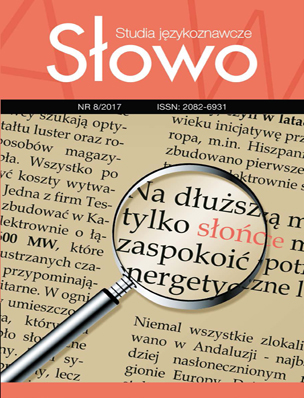Jak w unii za piecem. Innowacje językowe w polskich, brytyjskich i niemieckich artykułach prasowych na temat referendum w sprawie członkostwa Wielkiej Brytanii w Unii Europejskiej
DOI:
https://doi.org/10.15584/slowo.2017.8.08Abstrakt
The notion of linguistic innovation or neologism includes new lexical items as well as existing words or phrases whose meaning has been altered. Based on the classifications of neologisms proposed by Stanisław Grabias [1981], Stanisław Bąba [1986, 1989] and Gabriela Dziamska-Lenart [2004], the purpose of this paper is to present various types of linguistic innovations on the morphological and phraseological level. They are analysed in terms of structure, meaning and pragmatic purpose in texts. Particular attention is paid to lexical blends which encompass both word blends (i.e. portmanteau words) as well as idiom blends, i.e. blends of an idiom with a word or a combination of two idioms. The data analysed comes from articles published in popular Polish („Polityka”), British („The Economist”) and German („Der Spiegel”) weekly magazines shortly before and directly after the Brexit referendum. As the analysis shows, linguistic innovations mostly occur in press headlines especially in British texts. Apart from numerous idiom blends there are various examples of pun-like blends based on well-known quotations from popular culture. The main purpose of the analysed new lexical items is to attract the attention of the reader, to express the attitude of the author towards the entities described and thus to convey positive or negative valuations, to build a close relation between the author and the reader and to cause humorous effects.Downloads
Bibliografia
Bąba S., 1986, Twardy orzech do zgryzienia, czyli o poprawności frazeologicznej, Poznań.
Bąba S., 1989, Innowacje frazeologiczne współczesnej polszczyzny, Poznań.
Burger H., 2015, Phraseologie. Eine Einführung am Beispiel des Deutschen, Berlin.
Burska K., 2012, Kontaminacje jedno- i wielowęzłowe w nagłówkach prasowych i komunikatach reklamowych, „Folia Linguistica”, nr 46, s. 42–52.
Dobrovol’skij D., Piirainen E., 2009, Zur Theorie der Phraseologie. Kognitive und kulturelle Aspekte, Tübingen.
Dziamska-Lenart G., 2004, Innowacje frazeologiczne w powojennej felietonistyce polskiej, Poznań.
Grabias S., 1981, O ekspresywności języka. Ekspresja a słowotwórstwo, Lublin.
Granger S., Meunier F. red., 2008, Phraseology: An Interdisciplinary Perspective, Amsterdam–Philadelphia.
Langlotz A., 2006, Idiomatic creativity: A cognitive-linguistic model of idiom-representation and idiom-variation in English, Amsterdam – Philadelphia.
Lusińska A., 2007, Reklama a frazeologia, Toruń.
Majnusz-Stadnik M., 2014, Andere Länder, andere Werbestrategien. Phraseologismen und deren Modifikationen in den polnischen und deutschen Werbeanzeigen, Opole.
Miller D., 2009, Verwirklichung polnischer Träume vs. Ostkolonisation. Zum Ausdruck von Emotionalität und Wertung im polnischen Mediendiskurs zur EU-Erweiterung [w:] Die Ordnung des Standard und die Differenzierung der Diskurse, red. B. Henn-Memmesheimer, J. Franz, Frankfurt am Main, s. 417–428.
Miller D., 2017, Europa ist tot. Es lebe Europa? Der Brexit und die Folgen aus deutscher, britischer und polnischer Sicht [w:] Text im Fokus zweier Linguistiken. Aus der polonistischen und germanistischen Forschung, red. Z. Bilut-Homplewicz, M. Krauz, Frankfurt am Main, s. 183–206.
Nagórko A., 2007, Kontaminacje leksykalne – słowotwórstwo czy radosna tfurczość?, „Przegląd Humanistyczny”, nr 1, s. 203–211.
Ochmann D., 1997, Prasowe kontaminacje leksykalne (Analiza strukturalna), „Język Polski”, nr 2–3, s. 131–144.
Ratajczyk K., 2015, Kontaminacje leksykalne. Struktura – sens – pragmatyka, Lublin.
Wojtak M., 2010, Głosy z teraźniejszości. O języku współczesnej polskiej prasy, Lublin.
Cambridge Dictionary: http://dictionary.cambridge.org/
Dictionary.com: http://www.dictionary.com/
DUDEN: http://www.duden.de/
English Oxford Living Dictionaries: https://en.oxforddictionaries.com/
European Journalism Centre: http://ejc.net/ [dostęp: 22.03.2017]
Press Gazette: http://www.pressgazette.co.uk/seriously-popular-economist-now-claims-reach-53m-readers-week-print-and-online/ [dostęp: 22.03.2017]
Słownik języka polskiego PWN: https://sjp.pwn.pl/
Wielki słownik języka polskiego (WSJP): http://www.wsjp.pl/
Wikipedia: https://pl.wikipedia.org/wiki/Wikipedia:Strona_g%C5%82%C3%B3wna
Pobrania
Opublikowane
Jak cytować
Numer
Dział
Licencja
Prawa autorskie (c) 2017 Słowo. Studia językoznawcze

Utwór dostępny jest na licencji Creative Commons Uznanie autorstwa – Użycie niekomercyjne 4.0 Międzynarodowe.


